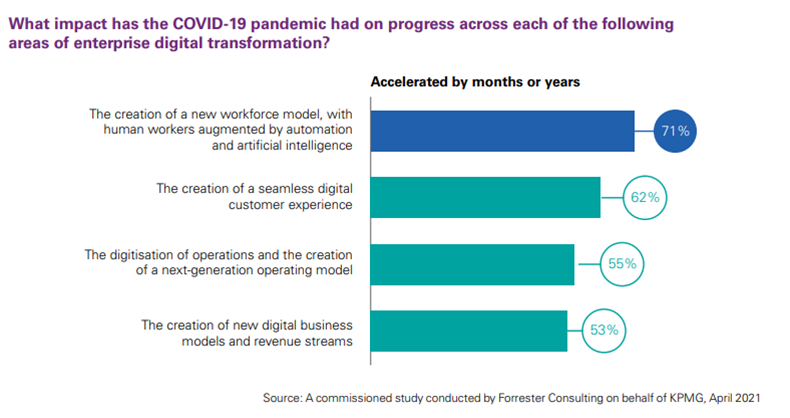Despite the huge acceleration in the velocity of digitalisation, organisations are still failing to keep pace with the demands of increasingly tech-savvy consumers.

And worrying for many employers in a red hot labour market, it is not only customers who have high expectations but workers as well.
But businesses around the world still expect to reap a growth dividend from their often huge investments in digital transformation since the pandemic began.
These are some of the findings in the 2021 Digital Fuel report written by Forrester Research and commissioned and published by KPMG. The research investigated the impact of COVID-19 on digital transformation strategies and sought input from 820 digital transformation strategy leaders in 12 countries and 12 sectors.
According to the study's authors, "Many organisations have found themselves months — or even years — ahead of where they expected to be."
But the great lurch forward may not be enough to keep pace, and might also explain why the report found that 46 per cent of senior executives surveyed expect further increases in their budgets over the next 12 months, while a further 27 per cent expect to maintain spending at least at the current levels.
Velocity
2020 heralded a huge increase in the velocity of digital transformation around the world as businesses were forced to send staff home and consumers shifted en masse to online consumption (and desperate cybersecurity professionals tried to keep their enterprise protected).

"Now, more than a year later, as markets rebound, companies are shifting their focus from survival to growth. There’s renewed confidence and a determination to grow revenue, boost market share, improve Net Promoter Scores (NPS) and target new customers. Seventy-one per cent of respondents to our latest 2021 digital survey say that revenue gains are a top priority. And as we’re seeing in the market, as asset prices rise and investors seek deals, there’s also an urgent need to enhance corporate value."
"Customers — and indeed employees, supply chain partners and other stakeholders — have a newfound appreciation for the digital experience and will expect it to get better. The number one digital transformation priority is to improve the quality of the customer experience."
That experience is not simply a matter of customer engagement in the moment. Trust in the brand is also critical with the report confirming the importance of sustainability as a driver of transformation. Among the key findings on this point;
- 60 per cent of business leaders report that there is more flexibility in their digital transformation business case process, making it more adaptable and enabling timely investment decisions under constantly changing market dynamics.
- Companies are also keen to embed trust through robust cybersecurity and strong environmental, social and governance (ESG) values and practices. Trust gives a license to operate, by winning the confidence of investors, employees, customers and communities, say the authors.
- Stakeholders expect organisations to be aligned with their values of respect for people and the planet and there are emerging standards on formally reporting non-financial impacts.
Four areas of focus
The four areas in particular where organisations say they are investing more deeply in digital capabilities are; meeting the customer on the customer's terms, creating an empowered connected workforce, enhancing digital agility to allow for new ways of working and building a trusted enterprise by keeping transaction and data secure and using ESG as a value driver.
The study reveals that the majority of the organisations surveyed are pursuing next-generation operating models and 62 per cent say they are trying to create more seamless digital customer experiences. More than a third have developed new channels to serve customers.
And while the shift to work from home may be the most visible workforce consequence of the pandemic, it is not the whole story. The report says, "Organisations are also investing in new technologies to enhance the workplace environment, with 33 per cent saying they want to improve the quality of the employee experience. And a majority (71 per cent) feel that the pandemic has accelerated their efforts to create new workforce models where human workers are augmented by automation and AI."
But technology alone will not keep restless worker bees from scouting out new hives. "It is equally important to create environments where workers feel in tune with the company’s values. When investing in digital transformation, leaders should consider how this can help foster team spirit, collaboration, and wellbeing. In the workforce of the future, one could say that purpose trumps process."
Business 3.0
Digital transformation is now recognised as the foundation of the new connected enterprise, and one that is built around the customer, according to the study. "Leaders are acknowledging the strategic, holistic nature of transformation."
Perhaps even more significantly though, the authors suggest the insights shared by the senior executives demonstrate that the pandemic has brought about a reckoning of purpose with both organisations and individuals reassessing what's really important to them.
"Organisational purpose has taken on a new level of importance, with raised expectations of tackling environmental, social and corporate governance (ESG) issues. Clients are increasingly bringing topics like equality, diversity, carbon footprint, waste reduction and ethical business practices into their strategic conversations.


_(23).jpg&h=140&w=231&c=1&s=0)
_(20).jpg&h=140&w=231&c=1&s=0)

.png&h=140&w=231&c=1&s=0)



_(26).jpg&w=100&c=1&s=0)

 iTnews Executive Retreat - Security Leaders Edition
iTnews Executive Retreat - Security Leaders Edition












_(1).jpg&h=140&w=231&c=1&s=0)



